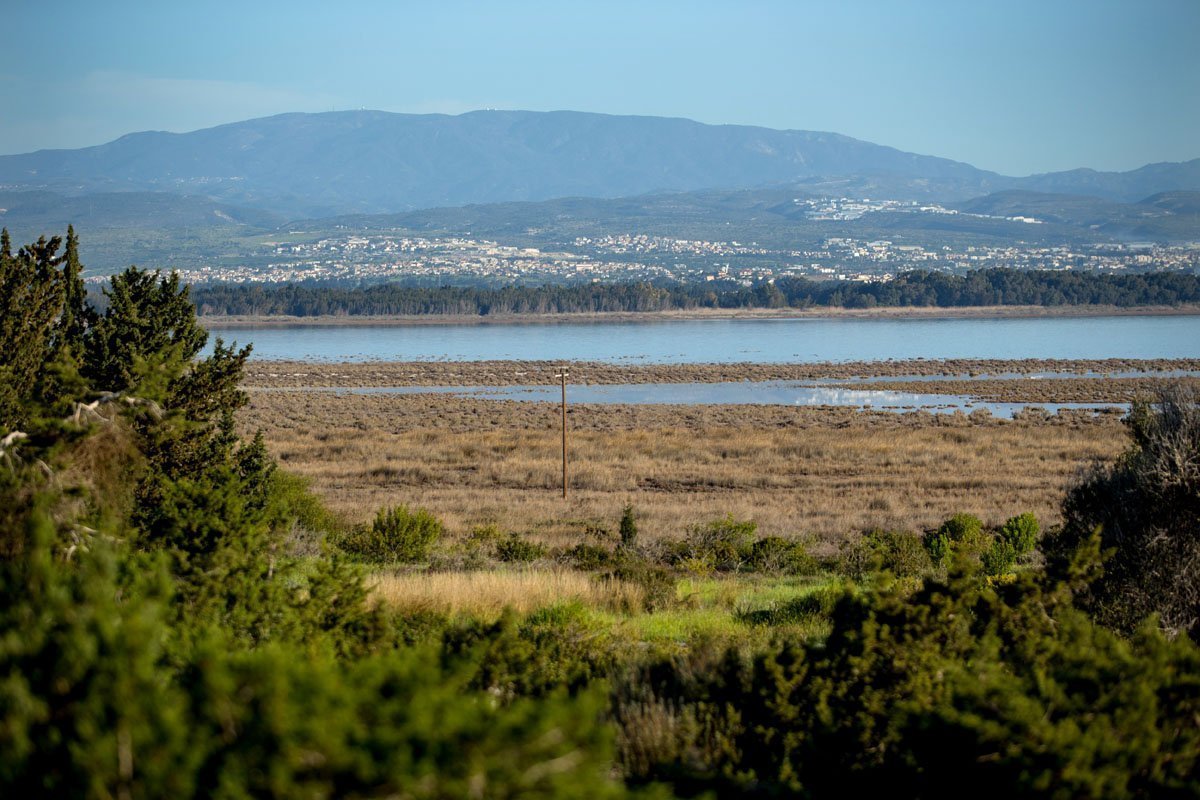Protection of natural areas
The protection and management of the most vulnerable species and habitats in Cyprus is carried out through the European network of ecological areas Natura 2000. In total, 29 Special Areas of Conservation (SACs), 11 Sites of Community Importance (SCIs) and 30 Special Protection Areas (SPAs) have been designated in Cyprus.
As part of our activities we are working to protect the natural areas, having an active role in preserving them. Uncontrolled development without strategic planning is one of the major threats for these Areas.
In order to adequately protect natural areas, we seek for the establishment of Management Plans for each Natura 2000 site and for their effective implementation. It is also very important to monitor these areas, so that the State and society actively protect them.
A prerequisite, however, for the protection of the Areas is their acceptance by and the cooperation of the local communities. Our goal is that people should feel and act consciously as an integral part of the Natura 2000 sites, to work for their protection and to benefit from the emergence of their natural characteristics.
As part of the BIOforLIFE project, we have prepared the interactive map BIOframe, which is a platform for collecting environmental information through the overlaying of different maps.
Akamas Peninsula
Akamas area is one of the most important natural areas of our island. The area is rich in species and habitats, with many rare and endemic species. Approximately 530 different plant species have been recorded in this area, of which 36 are endemic, i.e. they can only be found in Cyprus and nowhere else in the world… For example, the Cyprus tulip (Tulipa cypria) is an endemic and endangered plant species which is present in the area. In total about 6,000 plants are found on the island, of which only 2,000 are found in the areas controlled by the Republic of Cyprus. Apart from the plants around 170 different species of birds have been identified so far in Akamas, for example the roller, the Bonelli’s eagle and the peregrine Falcon. Akamas is also of a great geological and cultural interest.
On the BIOframe interactive map you can find the designating species for the Akamas peninsula, i.e. the species and habitats of Directive 92/43/EEC and the avifauna of Directive 2009/147/EU, the presence of which resulted in Akamas being included in the Natura 2000 network.
Threats to the Akamas region are various and numerous, for example the pressure for unsustainable building development with inappropriate uses, including existing illegal developments, uncontrolled driving of motor vehicles on the beaches and other important areas of Akamas and overgrazing.
Our Goal:
Adequate protection and management of Akamas, by encouraging mild developments within the settlement nucleus of the villages. In this way Akamas will be able to attract visitors who will admire the natural environment and then visit the surrounding villages to enjoy their special cultural character for recreation, nutrition and / or stay in local restaurants and hotels. This sustainable development model is the way we think that the local communities in the region and the existing small and medium-sized enterprises could benefit the most.
Paralimni Lake
This is one of the few natural wetlands of our island. It is adjacent to the Paralimni, Sotira and Deryneia Municipalities. The most threatened species of reptile in Cyprus – the Cyprus Grass Snake (Natrix natrix cypriaca), an endemic subspecies is found here. It is unique to Cyprus.
In addition, more than 100 different species of birds are hosted in the site, such as Spur-winged Lapwings, Egrets, Black winged Stilts, Kentish Plovers, various small birds and more. A happy surprise is also the Flamingos which over-winter in the area along with other migratory bird species.
More information about Paralimni Lake can be found at the Cyprus Wetland website which has recently been completed by our Foundation. In the interactive map BIOframe you can find the designating species for the Paralimni Lake, i.e. the species and habitats of Directive 92/43/EEC and the avifauna of Directive 2009/147/EU for which the Lake was included in the Natura 2000 Network.
Paralimni Lake faces many threats such as improper water management, uncontrolled waste disposal, disturbance by a neighbouring shooting range, driving in the lake, etc.
Our Goal:
Adequate protection of the species and habitats hosted in Paralimni Lake and promotion of their protection.
Akrotiri
The Akrotiri Peninsula is the most important system of wetlands in Cyprus. Akrotiri and Larnaca Salt Lakes are the only two regions of Cyprus that have been included in the Ramsar Convention List of Wetlands of International Importance from 160 different States. The Area has also been designated by BirdLife Cyprus as an Important Bird Area. Administratively, the wetland system of Akrotiri falls within the boundaries of the British Bases and is declared a protected area, corresponding to the European Natura 2000 Network, for its importance for birds and other species and habitats.
More information about the wetland system can be found at the Wetlands Cyprus (Ygrotopio) site which was recently completed by our Foundation. The wetland System faces various threats. The lack of good management and oversight of the area by staff specialized in biodiversity issues is perhaps the main problem. Access to, and activities in some environmentally sensitive areas of the peninsula are not controlled satisfactorily and as a result, many species of flora and fauna suffer extensive damage. Wading birds which nest on the ground, for instance, may have their eggs destroyed by vehicles and dogs that run free in the area. Unlimited access to the area causes great damage to very important plant habitats such as sand dunes and salt cedars. Especially during the summer months, the area of Lady’s Mile is under heavy pressure from the increased and uncontrolled number of visitors. The presence of stray dogs and cats is also a major threat to various species of fauna such as lizards and birds. Illegal disposal of garbage throughout the area is also an important problem that causes pollution in the wetland system, loss of natural vegetation and destruction of the area’s natural beauty.
Military use of the area is also a major threat to the wetland system. For example, the installation of the two large Pluto 1 and Pluto 2 antennae has raised great concerns about the dangers of migratory birds flying into them. Military planes and helicopters, especially when flying over the Salt Lake, may disturb large migratory birds such as cranes, which stop for a while on our island to rest before continuing their long journey. If these birds are disturbed and start their migration before they are well-rested and can take advantage of the thermals that help them rise higher, they may be unable to reach their destination and will die of exhaustion. An extensive analysis of all the threats to the wetland system can be found in the Management Plan prepared for the Area.
Our Goal:
The area of Akrotiri to be properly protected and managed so that man and environment can coexist harmoniously. The whole area, if properly managed and arranged accordingly, can be a pole of attraction for many naturalists, including hikers, nature walkers and bird watchers. Especially with regard to the reorganisation of the Lady’s Mile area, to limit the unrestrained access to the salt marshes. Visitors to the area should use a specific access road and paths to the beach so that they do not damage the ecosystems. We believe that if the Area is respected and promoted by all stakeholders, it can be an ecological gem of our island.
Loss of biodiversity
Biodiversity is the total of all living organisms on the planet. Protecting biodiversity is an investment for the future. Its loss is one of the most important environmental problems which humanity faces today, since the more species we have on the planet the better for our long-term survival. Also, biodiversity is vital for our health and quality of life, and it also has economic benefits. For example, the free services offered by bees are estimated at €265 billion a year. Human activities are accelerating the rate of loss of biodiversity.
Because of our geographical location, the island status and climatic conditions, the biodiversity of Cyprus is particularly rich, with a large number of endemic species, i.e. species that exist only in Cyprus and nowhere else in the world.
The main threats to biodiversity are the loss and degradation of habitats, invasive species, over-exploitation of natural resources, pollution and diseases, and climate change.
We are working to stop the loss of biodiversity.
We have participated in the European Project BIOforLIFE funded by Life + to inform and raise public awareness about the value of biodiversity.
The Terra Cypria Foundation is also a member of the International Nature Conservation Association (IUCN).
Trapping of Migratory Birds
It is one of the most important problems we face as a state, which dramatically contributes to the loss of biodiversity. Trapping of migratory birds on our island is mainly done with mist nets and lime sticks, methods that are non-selective; this means that both common and very rare species of birds can be trapped, indiscriminately.
Today, this activity has grown into an uncontrolled tax-free business with a profit of millions of euros. According to BirdLife Cyprus, more than 2.5 million birds are trapped each year by the illegal use of nets and lime sticks.
Cyprus is within one of the most important migratory bird corridors between Europe, Asia and Africa. This natural wealth could be harnessed to attract bird watching tourism.
Birdwatching is one of the fastest growing hobbies in Europe and America, and Cyprus is particularly suitable for this activity. Migration periods (spring and autumn) are periods when many tourists do not visit our island, but they could be encouraged to come with organized packages.
Bird watching, along with other forms of ecotourism, can be used to attract nature-environment tourism in general.
Clearly, to attract bird-watching tourists, the illegal trapping of migratory birds must be stopped, because you cannot attract bird lovers on one hand and, on the other hand, slaughter the birds they have come to see.
The Terra Cypria Foundation has prepared a report on the economic impact of this activity on tourism, considering how many people may not visit our island as a reaction to the failure to stop the illegal trapping of migratory birds.
Our Goal:
Effective countering of the illegal trapping of migratory species with demonstration of zero tolerance by all actors. The exhibition of political will, so that the competent authorities will maximise their efforts against illegal trappers and restaurants illegally serving these birds. Lastly, but importantly, we aim for implementation of the Strategic Plan to Address the Illegal Trapping of Birds in Cyprus, which was prepared by all stakeholders at the initiative of the BirdLife Cyprus. Association.
Sea Turtles
Two of the three Mediterranean Sea turtles, Caretta caretta and the Green Turtle (Chelonia mydas) nest in Cyprus. Both species are endangered and Cyprus is one of the most important nesting areas in the Mediterranean. In the areas controlled by the Republic of Cyprus, the Green Turtle mainly nests on the beaches of Lara and Toxeftra in Akamas. Caretta caretta also nests in Lara and Toxetra, but especially in the Natura 2000 area of “Polis-Gialia” in the bay of Chrysochou. Further information about the sea turtles in Cyprus is available on the website of the Fisheries Department.
Due to the exceptional importance of our island as a nesting place of sea turtles, our Foundation is particularly sensitive to the issues of protection and rational management of the beaches where they nest, and of their marine feeding sites.
Our actions, both nationally and at European level, are oriented so that any human activities that could possibly affect their reproduction and living spaces are appropriately assessed; they should be licensed only when certain that there will be no chance of damage to the species concerned. At the same time, we are constantly pressuring the Government to establish a mechanism of continuous surveillance and timely response in the event of illegal activities which could harm the turtles.
Combating Invasive Alien Species
With the development of trade and tourism the spread of invasive alien species has become a serious threat to biodiversity.
Invasive alien species are plants and animals that do not naturally occur in a region and if they become established they spread at a particularly rapid pace, competing for food and living places with local flora and fauna and eventually displacing them.
In many cases, invasive alien species cause damage to public health, agriculture, fish farming, etc. A typical example is the rat (Rattus rattus) that arrived in Cyprus via ships and caused huge damage to crops, bird nests, public health, agriculture, etc. Another example is the red eared turtle which, if left free in the natural environment of Cyprus, competes and dominates the freshwater turtle which is a native species of our island.
The invasive species have a large financial cost in the EU. In particular, the cost of controlling them and recovering the damage caused by them was estimated at € 9.6-12.7 billion per year.
Detecting and preventing their introduction is vital to controlling their spread and active public participation is essential.
Our Goal:
To inform the public and raise the awareness of the services involved, for example Customs, about invasive alien species and the need for their active involvement in order to control the spread. Developing action plans by the Government to tackle the most dangerous invasive species on our island. In general, we want Regulation 1143/2014 adopted by the European Commission in January 2015,to be implemented.
Agriculture
Agriculture at a local and at a European level is one of the key areas of interaction between nature and humans. Since the beginning of agriculture, its role has been to ensure sufficient food for humans and breeding animals.Today intensive agriculture, is distancing from traditional farming methods, high pesticide use and reduced productivity have placed enormous burdens on biodiversity and on soil, air and water quality.
Because of the degradation of ecosystem services, the inefficient distribution of agricultural subsidies and Member States’ commitment to climate change and sustainable development, the EU has reviewed previous measures in order to strengthen the CAP. As a Foundation, we monitor agriculture at national and European level through the relevant European Environmental Bureau’s (EEB) working group.
We believe that, as a state, we must adapt to our own specific needs, any European measure in relation to agriculture, so that it meets our needs and our commitments at national and community level.
As a country where small scale crops are dominant and where agricultural land is increasingly abandoned, we need to reconsider whether existing agricultural aids meet the objectives of climate change and sustainable development and make any necessary changes.
Agricultural aid should help both farmers and our island’s natural environment, and take into account the requirements and needs of Cyprus’s agriculture. It should comply fully with our European obligations.












